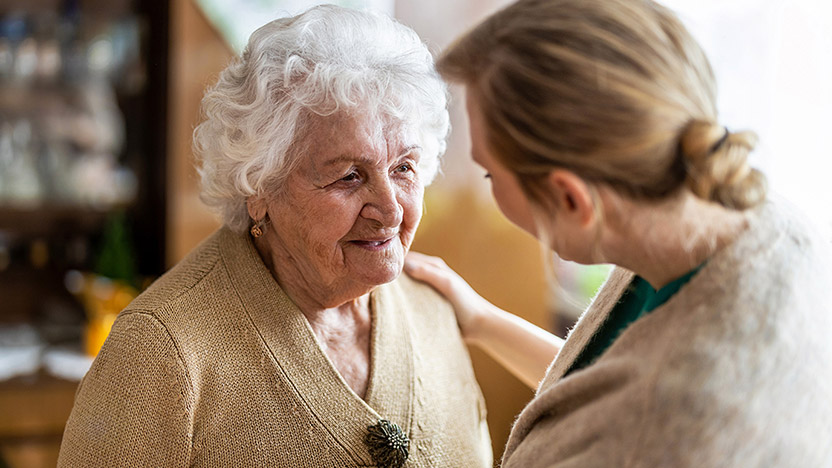More Than Memory Loss: Whole-Person Care
Alzheimer’s disease is more than just a medical diagnosis – it’s a life-changing journey that deeply affects both those living with the condition and the loved ones who support them. Practicing whole-person care is essential for dementia caregivers. As the disease progresses, symptoms like memory loss, confusion and difficulty with everyday tasks can make even the simplest moments feel uncertain and overwhelming.
Yet amid these changes, one thing remains constant: the importance of preserving the dignity and personal autonomy of those affected. For dementia caregivers, striking the balance between offering support and honoring independence can be both the greatest challenge and the deepest act of love.
In this blog, we’ll explore how to look beyond the diagnosis for seniors living with Alzheimer’s or dementia, creating safe spaces for seniors and their caregivers for a mutually beneficial caregiving relationship. Whether you’re just beginning to navigate a diagnosis or have been walking this path for years, our goal is to provide insight, encouragement and tools that help you care with confidence – while always centering on respect and humanity.
How Does Dementia Affect a Person’s Behavior and Personality?
As dementia progresses, changes in memory, thinking and behavior become more pronounced. You may notice your loved one forgetting familiar names, struggling with simple tasks or becoming easily agitated or withdrawn. These shifts can be unsettling, but they are a direct result of the disease’s impact on cognitive health – not a reflection of the person’s character or intentions.
Common changes include:
- Short-term memory loss
- Difficulty finding words or following conversations
- Disorientation in familiar places
- Mood swings, anxiety or suspicion
- Repetitive behavior or restlessness
Recognizing these symptoms as part of the disease can help caregivers respond with compassion rather than frustration.
It’s easy to get caught up in what’s changing, but it’s just as important to remember what remains. The person you care for is still present – still deserving of respect, love and connection. Living with Alzheimer’s may alter how they express themselves, but it doesn’t erase their identity, emotions or need for meaningful engagement.
Focus on:
- Preserving routines that bring comfort
- Encouraging participation in activities they enjoy
- Communicating in ways that preserve their dignity
By shifting your mindset from “managing a patient” to “caring for a person,” you reinforce their sense of worth and belonging. Remembering and honoring the good times with the individual can enable more compassionate care, despite the sudden changes and grief that accompanies these diseases.
There is no perfect script for senior care, but empathy and patience go a long way. When communication falters or behaviors become challenging, these qualities can ground you and guide your responses, helping create days with dignity.
Try to:
- Step into their reality instead of correcting it
- Use calm, reassuring tones when speaking
- Allow extra time for tasks and transitions
- Celebrate small victories and moments of clarity
Dementia care isn’t easy, but approaching each day with understanding can make the experience more peaceful for both you and your loved one.
Days With Dignity
When developing a comprehensive approach for individuals living with Alzheimer’s or another form of dementia, it’s essential to prioritize dignity at every step of whole-person care. This means going beyond simply encouraging independence and personal autonomy: it involves actively preserving the routines, roles and rituals that are deeply familiar.
These elements often connect to long-term memory and can spark recognition, comfort and a sense of purpose. By creating compassionate care in these familiar spaces, we help individuals maintain a sense of self and continuity, allowing them to navigate changes with as little disruption as possible.
Respect is especially critical when addressing senior wellness and personal care needs, such as hygiene and toileting. These moments require a heightened level of sensitivity and empathy. Care should be offered in a way that honors the individual’s adulthood and humanity. Avoid infantilizing and condescending a senior living with Alzheimer’s; instead, lead with compassion. Simple adjustments in language, tone and approach can make all the difference in preserving a person’s dignity during the most vulnerable aspects of daily life.
The Importance of Personal Autonomy in Alzheimer’s Care
For seniors living with Alzheimer’s or memory loss, maintaining independence and personal autonomy becomes increasingly vital. As memory fades and confusion sets in, many seniors may begin to feel as though their world is shrinking, often leaving them feeling powerless, frustrated or overwhelmed. That’s why it’s so important for dementia caregivers and loved ones to create opportunities and days with dignity that empower rather than replace the individual’s role in their own life.
Even seemingly small choices – like deciding what to wear, selecting meals or helping to set the table – can have a powerful impact on quality of life. These decisions may appear minor on the surface, but for someone facing a change in cognitive abilities, they represent a meaningful way to stay engaged and connected to their sense of self.
Supporting personal autonomy in day-to-day routines helps foster confidence, dignity and emotional well-being. Whole-person care allows individuals to continue participating in their lives, reinforcing their value and agency despite the challenges they may face. By maintaining independence wherever safely possible, dementia caregivers can help their loved ones navigate the journey of memory loss with more grace, resilience and respect.
Memory Care at Valage Senior Living by WellQuest
At Valage Senior Living, our specially trained dementia caregivers possess the knowledge and skills to provide for seniors navigating memory loss with whole-person care and compassion. Through personalized care plans, innovative memory care programming and thoughtfully designed communities, residents feel safe, secure and comfortable – enhancing their quality of life tremendously more than without this one-on-one support.
In addition to the extensive expertise from our caregivers and our welcoming community, we have also invested in innovative safety fall technology called SafelyYou Respond, so when a fall occurs, expert clinicians can help on-site teams understand what happened and how to keep it from happening again. This technology detects over 99% of on-the-ground events by activating video technology, and it enables caregivers to assess each fall’s severity and get residents the right care faster.
After the event, SafelyYou Respond’s fall experts develop interventions so falls are less likely to occur. Communities using SafelyYou Respond are consistently seeing 40% fewer falls and 80% fewer ER visits related to falls.
We are proud to offer SafelyYou in our memory care neighborhood to help keep your loved ones safe, and we also partner with Carson Tahoe Minden Medical Center, just steps away from our community, to coordinate quick care for residents who need it. If you are searching for assisted living and memory care in Nevada, contact us today to visit our beautiful new community in Minden, Nevada, which will open in spring 2025






